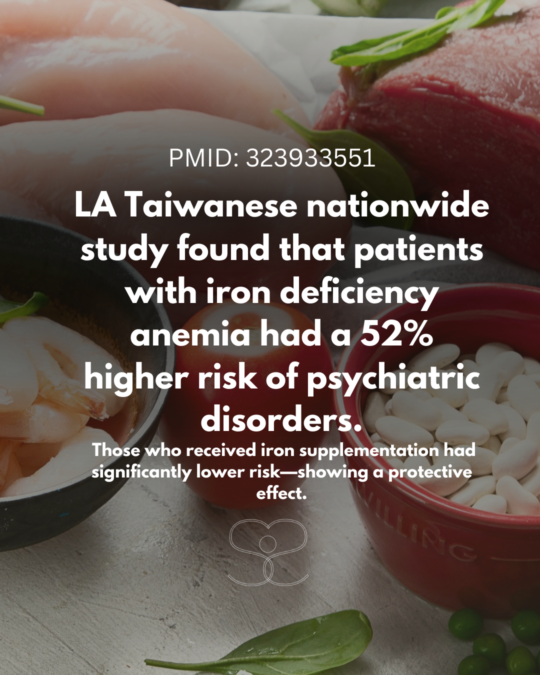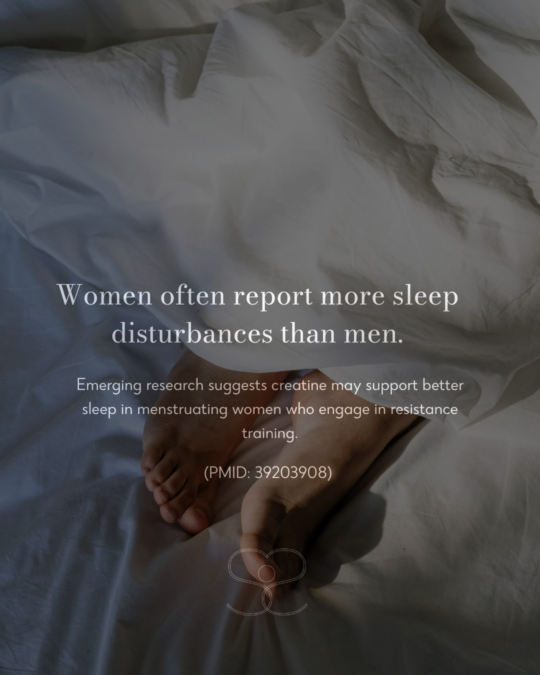The Link Between Iron Deficiency and Mental Health: Exploring Root Causes and Targeted Therapeutics

By Dr. Soha Salem, ND
Licensed Naturopathic Medical Doctor
Clinical Psychology Research – University of California, San Diego (UCSD)
Iron is a critical trace element, central to numerous physiological processes, including oxygen transport, neurotransmitter synthesis, myelination, and mitochondrial function. While it is well known that iron deficiency can lead to anemia and fatigue, its profound impact on mental health is often overlooked. Emerging research continues to highlight the important link between iron status and psychiatric disorders, including depression, anxiety, attention-deficit/hyperactivity disorder (ADHD), and post-traumatic stress disorder (PTSD).
As a naturopathic physician trained in both functional root-cause medicine and clinical psychology, I believe in looking beyond symptoms to explore underlying mechanisms. Here, we examine how imbalanced iron metabolism—both deficiency and overload—can contribute to mental health conditions, and how targeted interventions may support recovery.
Iron Deficiency and Psychiatric Risk: What the Data Shows
A large-scale nationwide database analysis from Taiwan (PMID: 32393355) revealed that individuals with iron deficiency anemia (IDA) had a significantly higher risk of developing psychiatric disorders. These included anxiety, depression, sleep disorders, and psychotic disorders. The adjusted hazard ratio (aHR) was 1.52, indicating a 52% increased risk in the IDA population compared to those without IDA. Notably, patients who received iron supplementation had a significantly lower risk of developing psychiatric disorders, suggesting a protective effect.
Furthermore, a 2024 Mendelian randomization study (PMCID: PMC10977787) using genetic data from over 218,000 individuals provided robust evidence for a causal relationship between iron status and anxiety disorders. Higher genetically predicted levels of serum iron, ferritin, and transferrin saturation were associated with lower risk of anxiety disorders. These results help to clarify prior inconsistencies in observational studies and reduce concerns about reverse causation or confounding.
Mechanisms Linking Iron and Mental Health: A Closer Look
Research has identified three primary mechanisms by which iron influences brain function and contributes to mental health disorders:
1. Neurotransmitter Synthesis and Signaling
Iron is a cofactor for key enzymes involved in the synthesis of serotonin, dopamine, and noradrenaline. Deficiencies in brain iron can impair these pathways, leading to reduced neurotransmitter availability and altered neural connectivity. Clinical and animal studies link iron deficiency to disrupted dopaminergic activity in the prefrontal cortex and substantia nigra—regions critical to emotional regulation and motivation. These disruptions are particularly relevant in conditions like depression, ADHD, and social-emotional development delays in children.
2. Oxidative Stress and Neurodegeneration
Iron’s redox properties enable it to support cellular respiration, but excess iron can catalyze the production of harmful reactive oxygen species (ROS) via the Fenton reaction. Brain regions affected by iron overload show increased oxidative stress, mitochondrial damage, and neuronal apoptosis. These processes have been documented in both animal models of PTSD and depression, as well as in neurodegenerative diseases like Alzheimer’s and Parkinson’s. Iron chelation therapy, particularly using agents like deferoxamine, has shown potential in mitigating oxidative damage and improving neuroplasticity in preclinical studies.
3. Myelination and Neurodevelopment
Iron is indispensable for oligodendrocyte function and myelin synthesis. Disruptions in myelination during critical periods of brain development are associated with long-term cognitive and behavioral deficits. In psychiatric disorders such as schizophrenia and autism, altered white matter integrity has been reported, and iron deficiency during early life has been implicated in these findings. Both human and animal studies demonstrate that early-life iron deficiency can lead to hypomyelination and subsequent changes in synaptic plasticity and mental performance.
Iron Supplementation: A Targeted Clinical Strategy
Clinical interventions targeting iron status—whether via supplementation in deficiency or chelation in overload—are gaining attention as adjunctive therapies for mental health care.
- In iron deficiency, addressing the root cause is crucial. This involves evaluating dietary intake, absorption issues (e.g., low stomach acid, celiac disease), menstruation-related losses, and chronic inflammation. Oral iron therapy, especially when combined with cofactors such as vitamin C and bioavailable iron forms, can be effective.
- For iron overload, particularly in genetic or inflammatory contexts, targeted iron chelators and emerging liposomal delivery systems offer promise for CNS-specific modulation without systemic depletion.
Importantly, the timing of intervention also matters. Iron deficiency during infancy or early childhood is particularly detrimental, highlighting the importance of screening in pediatric and perinatal populations.
When Iron Deficiency Is Mistaken for a Psychiatric Diagnosis
One of the most concerning findings from the literature is that iron deficiency is frequently misdiagnosed as a primary psychiatric disorder. While symptoms may align with depression or anxiety criteria, the root driver may be biochemical and reversible.
In fact, the review highlighted that antidepressants alone were less effective unless iron deficiency was addressed. This not only delays recovery but may also expose patients to unnecessary long-term medication use without resolving the underlying issue.
Looking Beyond Iron: A Trace Element Perspective
While iron plays a pivotal role, it does not act in isolation. Emerging research is also exploring the roles of zinc, copper, selenium, and manganese in mental health. Imbalances among these essential nutrients may further contribute to oxidative stress, neurotransmitter dysregulation, and neuroinflammation. Future integrative models of mental health will likely benefit from a trace element systems approach, incorporating diagnostics such as RBC mineral panels and individualized supplementation protocols.
Conclusion: Restoring Balance at the Root
Mental health is not solely rooted in brain chemistry—it is a dynamic interplay between our genetics, nutrient status, stressors, and lifestyle. As research continues to evolve, it becomes increasingly clear that iron status is both a biomarker and a modifiable driver of psychiatric risk.
As a naturopathic doctor grounded in clinical psychology and functional diagnostics, I advocate for comprehensive screening of iron metabolism in patients with depression, anxiety, ADHD, or neurodevelopmental concerns. Identifying and treating underlying deficiencies or imbalances offers a powerful opportunity for prevention and healing—one rooted not just in symptom suppression, but in cellular restoration and neurobiological resilience.
If you are struggling with anxiety, depression, or unexplained fatigue, it may be time to investigate what lies beneath the surface. Integrative assessment of iron and other micronutrients can be the first step in reclaiming mental wellness from the inside out.
Caption instagram
When Iron Deficiency Is Mistaken for a Psychiatric Diagnosis
One of the most concerning findings from the literature is that iron deficiency is frequently misdiagnosed as a primary psychiatric disorder. While symptoms may align with depression or anxiety criteria, the root driver may be biochemical and reversible.
A review paper (PMID: 10595923) published in the Journal of PubMed Central (PMC), by the U.S. National Library of Medicine (NLM), delves into the psychiatric manifestations of iron deficiency anemia—an often overlooked but clinically significant connection.
In fact, the review highlighted that antidepressants alone were less effective unless iron deficiency was addressed. This not only delays recovery but may also expose patients to unnecessary long-term medication use without resolving the underlying issue.
From a root-cause perspective, iron is not just a hematological marker—it is essential for neurotransmitter synthesis, mitochondrial energy production, and oxygen delivery to the brain. As a naturopathic medical doctor with a research background in clinical psychology, I often see how symptoms like anxiety, low mood, fatigue, and sleep disturbances are misattributed to primary psychiatric disorders, when in fact, underlying iron deficiency is at play.
In practice, identifying and correcting iron deficiency can profoundly shift clinical outcomes—supporting not only physical energy but also cognitive function and emotional resilience.
This information is educational and not a substitute for medical care. If these symptoms resonate with you, you’re invited to schedule a personalized consultation through my practice.

